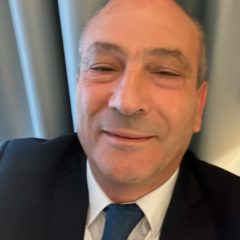27
Apr 2023
Public Leadership
Avi Dadon
Leadership, delivery, pathfinding, direction: these qualities are all required in any organization or group of people. Every organization has its own mission, its ultimate goals, and its own DNA, but they all rely on the same basic principles.
Above all, the element that truly fuels this can be summed up in one word: concern!
From the first stirrings of self-awareness, concern – for society and for the organization, business, or company – motivated me to avoid sitting on the fence; instead, to always have an opinion and to be involved in driving forward the achievement of objectives.
My general perspective is that it is not enough just to have an opinion. One should also strive to implement it. When necessary, I have enlisted and motivated others so that they, too, would be partners both in the process and in the vision of the future.
My leadership style is distinguished by the following features:
- Complete honesty and integrity – I say exactly what I mean, and there is only one truth.
- ‘My word is my bond’ – even when saying ‘I don’t know’ or I’m not an expert on this matter’, I stand by this. There is nothing improper or unacceptable about this – quite the opposite.
- In-depth study of every single detail, just as experts in the subject would do – but not in place of them.
- Leadership, rather than just technical or bureaucratic management, as the main and deeply implanted principle.
These main characteristics, as described above, should be part of management behavior in any organization, but particularly within public service.
Of course, when leading, you may run into other opinions and people acting on them. Throughout my career in its various phases – in the army, the commercial world, the security arena, and national projects – I found myself coming up against the positions taken by colleagues and more senior management.
In retrospect, after we succeeded, they all recognized that, at the time, they did not see the whole picture and did not understand what needed to be done, which was to move forward and do something.
Sadly, public servants who work with integrity and goodwill sometimes make the mistake of not expressing their professional position clearly and pointedly while taking personal risks. Yes, there are many risks involved when there’s a chance your ideas won’t be accepted. This is worse as a leader, when you begin to move towards achieving a goal, often alone, with little support.
My role as a leader is to choose the correct route according to the organization’s purposes and aims, to drive forward and promote issues with full knowledge that I might not be in agreement with those inside the organization for whom I am responsible, with my organizational peers, and even on a national level.
I will describe an example. The COVID-19 era was a huge national test of public leadership from every aspect and in every sector. At that time, I had a leadership position in the Department of Procurement, which was part of my service in the Ministry of Defense. We had to find ways of dealing with the COVID-19 pandemic in an environment of total uncertainty. My ability to direct the Department of Procurement strongly derived from this model of leadership based upon a completely unbiased moral compass.
I acted and delivered in accord with my conscience, which dictated that my true bosses were the taxpayer and our clients: those who were fighting the pandemic; namely, the medical teams. During this upheaval, which could easily have been exploited for bad purposes by many elements – and there were, indeed, such instances – I came up with the following saying: ‘Do not corrupt my Procurement’.
We had to act swiftly to get resources, while zealously following bureaucratic processes, recording everything, and providing a professional and realistic solution. That created inherent tension. I knew that I had to navigate by my ‘North Star’, and in retrospect I came to understand that this leadership had a very wide-ranging influence.
The media responded with support both for these processes and for the outcomes which were achieved, as did the Prime Minister, the Defense Minister, senior officials within the health system and the army, and others – and quite rightly so!
Government expenditure on Procurement during this period stood at more than 4 billion shekels. Without my decision-making and navigation according to the standards I had set out, the same action framework would have cost an extra 1.5 billion shekels.
After following this style of leadership through six years of activity and 70 billion shekels of expenditure, this is what I want to point out: not one employee was fired and not a single business closed which related to the provision of supplies to the Ministry of Defense. This was despite having no consistent Budget Law (following a period when there were several elections), and by the exigencies of COVID-19. Despite those factors, we supplied the Israel Defense Force’s needs fully and, as noted, worked in conjunction with the industries and suppliers who contributed to this success.
In summary:
Every public servant should feel that they are a leader; they should lead by utilizing a strong ethical compass to create general confidence, to believe, to act, to take risks, and to be free from fear if they act with integrity and remain without any legal or ethical blemish.
It is a great privilege to be a public servant, a huge satisfaction to contribute towards the realization of dreams and visions on behalf of the public.
Best regards,
Avi Dadon

Get to know the author
Avi Dadon (WSL 2016) is a retired colonel and served in public security roles for most of his adult life in the Israel Defense Force and the Ministry of Defense. In his last role before retiring from public service, he acted as Deputy Director General and Head of the Directorate of Procurement in the Ministry of Defense (“MANHAR”). When the Covid 19 pandemic broke out, Avi led an unprecedented national procurement drive in a range of activities: national medical supplies, the opening of hotels for the isolated and the sick in order to relieve pressure on hospitals, setting up of testing sites, setting up of laboratories for processing the samples, and more. He is married to Riki, the father of 4 children, and the grandfather of 4.

